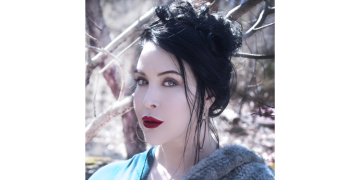“Songs in Flight,” a new cycle by the composer Shawn Okpebholo, with texts chosen by Tsitsi Ella Jaji, a poet and associate professor at Duke University, had its premiere at the Metropolitan Museum of Art’s Grace Rainey Rogers Auditorium on Thursday. With an opening set by the singer-songwriter Rhiannon Giddens, the concert found uncommon power in the humble format of folk and art songs.
Okpebholo and Jaji drew their subject matter from “Freedom on the Move,” a database containing thousands of ads placed by slave owners in newspapers to track down enslaved people who had escaped their captors. Like slave-auction posters and lynching postcards, the runaway ads are gruesome in the way they normalize human subjugation.
The achievement of “Songs in Flight,” a work commissioned by the art-song enthusiasts of Sparks & Wiry Cries and directed by Kimille Howard, is that it takes these murky, dehumanizing documents and illuminates them, shifting their perspective to reveal the person hidden in plain sight.
Giddens, a crack banjo player and penetrating storyteller, opened the evening with a few of her own songs before joining three other singers for the main event. The way her voice pealed on top and nestled into a rich sound in the middle and bottom of her range — all well tuned and discreetly controlled — hinted at her conservatory training.
Speaking to the audience between songs as she tuned her banjo, Giddens wryly observed that “Build a House,” a patient, poetic retelling of the exploitation of Black people for the enrichment of a nation, was about “oh I don’t know, the past 400 years.” She described her artistic process as one of “taking scraps, ephemera, rumors, stories” — the artifacts left to Black Americans as part of a fractured, suppressed historical record — and fleshing them out.
In past work, Okpebholo and Giddens have excavated the plight of Black Americans to reveal its impact on people. Okpebholo’s two-part song cycle “Two Black Churches” honors the victims of racially motivated violence with its compassion; and Giddens’s opera with Michael Abels, “Omar,” tells the story of a Senegalese Muslim scholar forced into slavery.
At the Met, the decision to project the runaway ads onstage and have the performers recite lines from them provided crucial context and eliminated any possibility for abstraction. The gulf between the ads’ blasé tone and the evocative lyrics by Jaji, Tyehimba Jess and Crystal Simone Smith demonstrated, to borrow from Giddens’s remarks, “the quotidian nature of evil.”
The ads contain dates, locations and rewards, but they also describe how enslaved people looked, sounded and behaved. In that sense, they offer remarkable primary source material — proof of a spirit that endured for posterity.
In his piece, Okpebholo zeros in on this duality — on the simultaneous presence of good and evil, perseverance and depravity — with beauty and harshness. The opening number, “Oh Freedom,” begins as an a cappella spiritual before the piano enters with obdurate clusters of bass notes. The melody soars while the piano maintains its ugly, even pulse — different sounds that seem to belong to different songs yet are bound together by history.
Okpebholo chooses discrete moments to show kindness toward his subjects, almost as though he couldn’t bear to leave them out in the cold. In “Asko or Glasgow,” minor 11th chords wash over the soloists with warm, glimmering harmonies. The quick, twinkling figures of “Mariah Frances” could be moonlight playing on a tree canopy, a companion to Mariah as she makes her escape.
The pianist Howard Watkins, dignified and unshowy, resisted moroseness as well as sentimentality, locating the power of the piece in its observational lens. Even in the wrenching song “Ahmaud” — a tribute to Ahmaud Arbery, who was gunned down in 2020 by vigilantes — Watkins avoided milking the delicate, quietly devastated piano part as Giddens sang the lyric with the immediacy of a dramatic monologue.
Giddens provided the work’s poised, unimpeachable moral center. The countertenor Reginald Mobley shared her ability to layer humor atop certainty, turning lightness and optimism into forms of defiance. Will Liverman’s brawny, bristling baritone lent the piece backbone and solemnity. The soprano Karen Slack, her words sometimes muffled by her sound, gave the cycle its emotional release.
The variety of voices and points of view enlivened Okpebholo and Jaji’s cycle with distinctive personalities, turning scraps of history into portraits of bravery.























